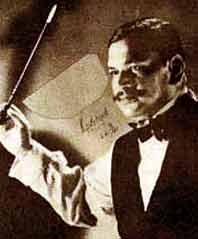Know Everything About Rai Chand Boral

Known as Bhishma Pitamah-a great patriarch-of Indian film music, Rai Chand Boral left a legacy that not only transformed Indian cinema but formed the building blocks of film music in India. His contributions, innovations, and total commitment to the craft won him awards of highest laurels and earned the undying respect of generations of musicians and listeners.
Early Life and Musical Roots
Born on October 19, 1903, in Calcutta, Rai Chand Boral was brought up in a family that was deeply steeped in classical music. His father, Lal Chand Boral, was an accomplished Dhrupad musician. From the very beginning, Rai Chand also went through some serious training of his own at the hands of Ustad Mushtaq Hussain Khan of the Rampur-Sahaswan Gharana, Masit Khan, and Ustad Hafiz Ali Khan, amongst others. These early lessons, chiefly in tabla and classical traditions, were to presage many of his inventions in the realm of film music.
Music Industry Emergence

His musical career got off the ground in 1927 when he entered the Indian Broadcasting Company, the establishment of which was a major event in the history of early Indian audio culture. By 1931, he was with New Theatres in Calcutta, in the days of silent films. Here, he would work with Pankaj Mullick, and together, they changed Indian film music forever. During this epoch, Boral worked on producing live musical accompaniments for theatrical presentations, and as the talkies came in, he began to compose for films.
Innovator of Playback Singing

Rai Chand Boral entered the hall of fame in the year 1935 for introducing the concept of playback singing into Hindi movies in Dhoop Chhaon. The first playback recording consisting of the song "Main Khush Hona Chahun" by a chorus of female voices led by Parul Ghosh was a landmark in film production and music direction. This innovation ushered in many generations of playback singers, thus transforming the means of production and wearing down consumption for Indian films.
Musical Style and Legacy
What differentiated Boral was the original amalgamation of Northern Indian-style Ghazal singing with Bengali tunes of the 19th century based on the utilization of string instruments. It gave early Indian cinema a polished and emotionally resonant sound that laid down a musical path for composers to tread for several decades. His later works in Bombay, including songs for Dard-e-Dil with Lata Mangeshkar, further established his repute as a composer of rare mastery and great feeling.
Honours and Final Years

In 1978, Rai Chand Boral was conferred with two of the most prestigious awards in the Indian arts, namely, the Dadasaheb Phalke Award for lifetime achievement in cinema and the Sangeet Natak Akademi Award for Creative and Experimental Music, in recognition of his pioneering contribution towards the creation of the Indian film music industry.
Lasting Effects
Rai Chand Boral drowned in a river of time in 1981 at the age of 78, but the consequences are still deep. His anticipatory vision and creative genius in the arc of music and culture have remained an inspiration for future musicians and movie makers. The means a legacy are living and active and not history, but as a living influence on the soundscape of Indian cinema.



